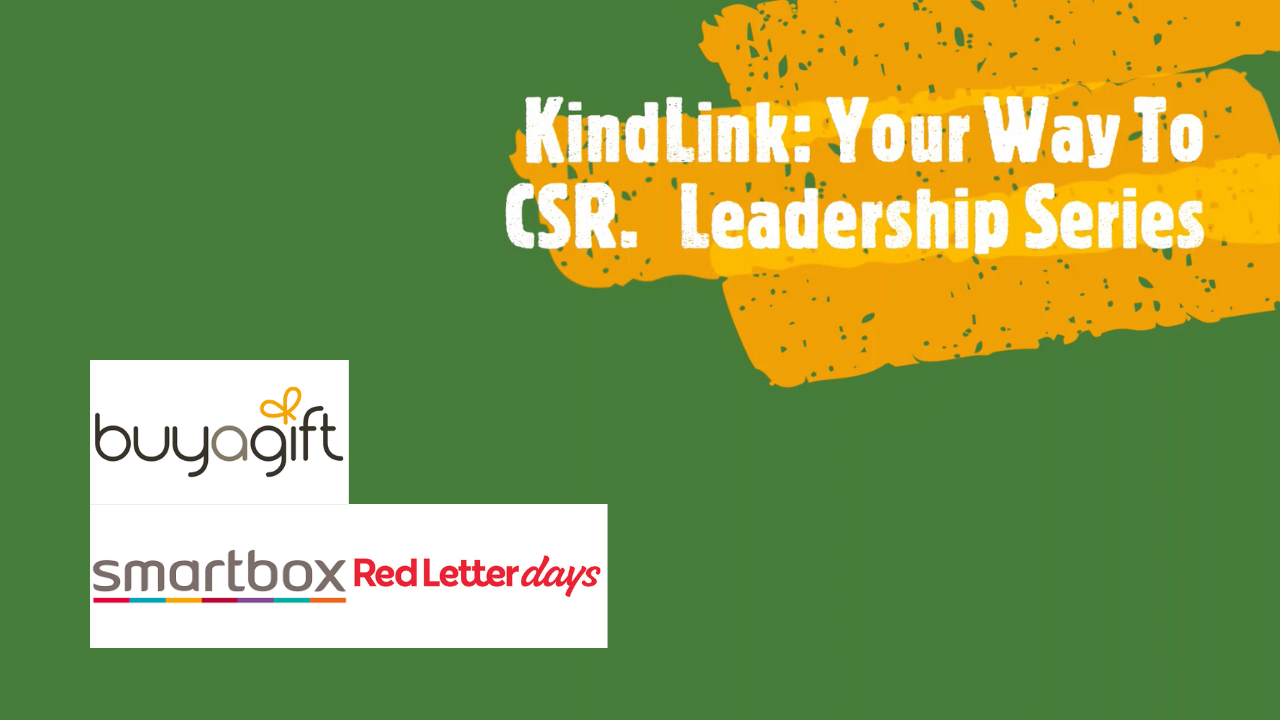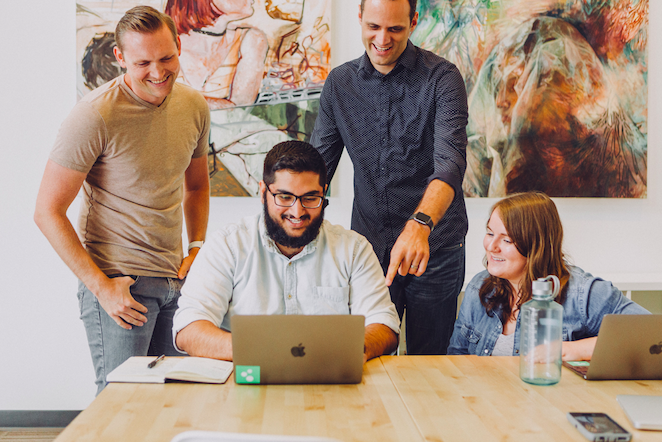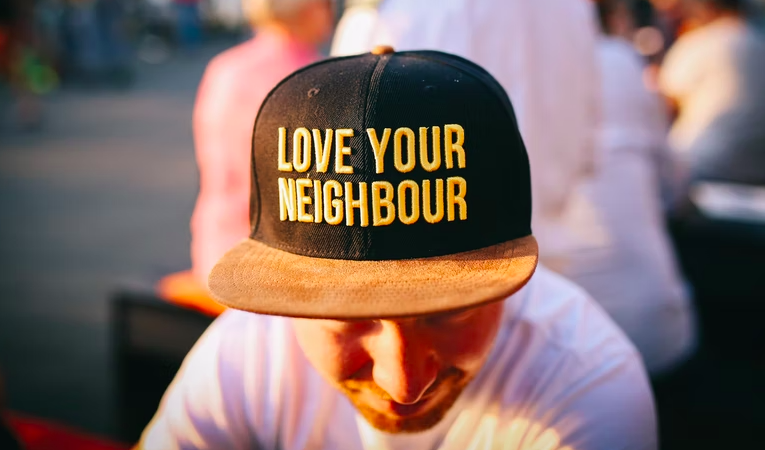
Welcome to the first in our "Your Way To CSR Leadership Series" of interviews, where KindLink speaks to the professionals leading the way when it comes to progressive CSR practice around the globe...
To watch a video of this interview, please head here.
Hi Catherine, great to hear from you. Could we kick off by asking who you are and what you do?
I'm Catherine Ainsworth. I'm Head of CSR at Smartbox UK. Smartbox UK is the company name for the two brands Buy A Gift and Red Letter Days (people have sometimes heard of these brands, rather than the company itself!) We specialise in providing gift experiences to customers.
Could you tell us a little about the way that Smartbox UK is currently approaching CSR?
Our HR department has always taken CSR very seriously. They've made sure that our work in the community and our work with employees has been exceptional. But we've never had a dedicated CSR department - until about nine months ago.
What we're doing at the moment is bringing together the strands of all of the work that we've been doing already (within marketing, HR, finance and in all areas of the business) to understand where we are and where we want to be in order to plan that pathway.
I've been working on sustainability within Smartbox UK for close to two years now, and it's only recently that we've expanded my role to include bringing together all elements of CSR.
Why does Smartbox focus on sustainability?
To be honest, there is a very strong sense that we just have to do it! It's not about pleasing stakeholders, it's not about being seen to be doing the right thing, it's actually about doing the right thing.
We have a CEO who is incredibly engaged in the environment particularly, and in ensuring that we have a positive impact. And even if there were no customer benefits at all, he would still want us to be working on this. So, there is a significant part of it where it is genuinely just that it feels like it's the right thing to do.
However, we are also very much seeing that sustainability is a growing area of concern for customers. They want to know that the brands that they're shopping with reflect their values, and take their impact on society and the environment seriously. It's about bringing that together and making that accessible to customers and our employees.

What are the most important elements of CSR that you focus on?
The three core pillars of the CSR programme are the environment, the community and our people. I think you'll probably find that a lot of companies, when they look at CSR, are looking at those three core areas – understanding their impact and involvement in all of those three areas.
-
The Environment
The thing that is probably driving forward CSR at Smartbox at the moment is sustainability, more than anything else. We are trying to lead the way in the industry on sustainable issues. There is nobody else, as far as we know, in our space, doing any work in sustainability. And so we've really focused on understanding our impact, and then really getting into the detail of how we minimise that impact.
We are a carbon-neutral company, and we have been for about 18 months. Being carbon neutral is very important in many respects, but to be fairly blunt, you can be carbon neutral by understanding your footprint and paying for carbon offsets. That's not what we're about. What we're looking at now is “how do we decarbonize? How do we move towards net zero?”
We would really like to be able to achieve Net Zero ahead of 2050, which is obviously the Government's goal. We want to hit it by 2040, maybe even sooner than that. And so we're working quite hard around sustainability at the moment.
-
Community
We're also trying to improve our involvement in the community, more than just making a couple of lump sum donations to charities every year (which we've done for decades – since we started, that's been something that we do.) Instead, we’re really looking at “how do we engage with the community?”
The money is important – the charities that we give the money to depend on it – so we're not saying that we shouldn't continue to give back through charitable donations. But there are other ways of being involved in the community.

So, we’re looking at things like volunteering days and looking at pro bono work. How can we potentially help charities, especially smaller charities? Say for instance, if we've got a social media manager who wants to do a volunteering day – could they actually do something that uses those skills (potentially mentor or share skills with their counterparts at a charity) rather than going to paint a community centre wall (which is great, but arguably not the best use of their specific skills!)
-
Our people
The work that we do with our people has always been to a very, very high standard. We've always been quite mindful of our role as an employer and taken that seriously. For several years we've taken part in big industry-wide surveys, and to kind of make sure that we're very clear about what the benchmarks should be, and that we're pushing ourselves forward. We've always done quite well in those and we get better each year because we take that really seriously and deliver on anything that we see emerging as an issue out of those things.
How do you measure the success of your CSR programme?
So for sustainability, it's easier to define very objective, very specific science-based targets. Once you've measured your carbon impact, you have a very clear number to attribute to that impact. And you can then set yourself targets, whether that be to make a percentage reduction of your overall impact, or to potentially target specific areas of your footprint to focus on – for instance, your downstream distribution or whatever it might be. Those are fairly straightforward targets. Obviously, you've got to do the complex bit of sizing your footprint and understanding your impact. But once you do, you can set those targets.
We also have targets around our employee engagement, how they feel we're doing on various really important topics such as diversity and inclusion. We measure those via internal surveys and also annually through an external survey, where we benchmark ourselves against other companies and see how we're doing.
Do you believe that CSR is central to your organisation, and if so, what is the evidence?
Yes, I do believe CSR is absolutely central. I think if I didn't believe it was absolutely central. I'd be asking myself what I was doing and why I was doing it! So yes, I do believe it's absolutely central to the organisation.
I think internally you see the evidence that CSR is important. Every single time we have a company update, it's more often than not on the agenda. It's almost always what our employees ask about. It seems to be something that the entire company gets behind. And we can definitely see that our team believes in what we're doing and believes in our commitment to it by our internal surveys.

Are there any elements of your CSR strategy that you’re looking to improve upon?
If I'm going to be entirely honest, I think a weakness of what we're doing at the moment (which is probably driven by the fact that we're still in the fairly early days of defining our CSR) it's external communication. I think if you were an external stakeholder (say a customer or somebody who was interested in the business) I'm not sure it would be as clear to you.
I think that's really a gap that we are looking to address in the next year, essentially, to just become a little bit more transparent about what we're doing. We are doing lots of work, but we're not talking about it as much as we could be. And I think that that comes from (in complete honesty) a place of not wanting to say or do the wrong thing at this early stage, or hold ourselves up to be in any way "morally superior" or anything like that, because you've got to be careful with these issues - being non-judgmental and to not hold yourself up as perfect.
I think in order to communicate successfully externally, you need to balance your awareness of that. So, I think that will be coming over the next year. In terms of making our goals more transparent, we're hoping to set some science-based targets that are in the public domain so we'll have to start reporting on them and that will become much more transparent. I think that it will be much easier for people to see our commitment from outside the company.
Has digitalisation impacted your CSR and how?
We've always been a pure-play digital company anyway, so all of that stuff has been around for us for years. There's been very little that I would say hasn't been digitised for a while.
Obviously, we've started working with KindLink over the last year or so, and obviously, the work that we're doing is deepening and accelerating now. So, what we would hope is that those sorts of tools make it more visible, and easier for more people to see what we're doing.
How has CSR changed in the last five years?
When I think about CSR (from before I took on any responsibility for it) I think about one of my first roles. close to 20 years ago, with a really big UK retailer. Their CSR team was led by lawyers and was very much about due diligence – about making sure that what they were doing was compliant with the law. It was really much less about engaging with the world and much more about ticking boxes of "yes, this is legal" and "this is the minimum that we have to do."
Obviously, that was a very different company from the company that I'm with now. But really, CSR these days is much more externally focused, much more about your impact on society and the environment, and much less about just doing your due diligence.
It's very important that you make sure that all your practices are compliant, that you're not taking advantage of anybody and that everything is just how it should be. But that's not what CSR is anymore, especially with the growth in awareness around the climate crisis, and thinking about things like COP26.
The UK Government made commitments at COP26 that means all companies in the UK should have a plan for how we're going to decarbonise. Well, I can tell you that most companies don't have a plan! I think this is going to be a massive growth area. There's going to be a lot of people really wanting to understand their impact – how do they size their impact, and how do they plan to decarbonize? What does that look like?
What do you think CSR will look like in the next five years?
I think CSR has become much more about sustainability than it used to be, and I think that will continue. Sustainability will become a much bigger part of the CSR landscape. I think it already is for most companies that are active in the CSR space, but I think there are some companies that haven't really started thinking about this yet. They're going to be forced to start thinking about it as a result of the world being the way it is, and the fact that we do need to really quite seriously look at how we decarbonize the economy.
I also think that one of the really interesting and really inspiring parts of CSR (and I think one of the things that just naturally works across all levels, because the team gets really engaged in it) is community outreach. So, how do you become a company that gives back to the community in a real and practical and visible way? And particularly about how companies engage with the local community where their offices are based.
Often you're renting an office and you go to work and that's where it starts and ends. But actually, when you are in a local community, you can really engage – you can become a really positive part of that local community, if you want to be. I think that will be something that some companies start to think a little bit more about – how do they engage with the community where they are?

What are your top three lessons from running an efficient CSR programme?
I think the number one thing has been not to let perfection be the enemy of the good. By which I mean (and I think this is an issue that you can come up against, especially in sustainability) it's a bit frightening and you want to get it right. Everybody has a strong opinion, and sometimes, when you strive for perfection (when it has to be the right answer from the beginning - you have to get it perfectly right or the whole thing's a failure) it can actually stop you from making progress.
It may be that you can't initially do that one thing that you know will get you to your goals. Maybe you need to change the packaging on your product to make sure that it has the lowest impact on the environment. And actually, you find out that you can't quite do it the way you wanted to? Well, it's better to at least start and to make the small changes than to wait until you can do it perfectly. I think making any movement in the right direction is positive. It's better just to get going, make those positive steps and build on that, rather than just constantly waiting until you know exactly what you've got to do and you get it perfectly right.
The other thing is to get the engagement of the team. I don't know how other companies are structured, but in our company, CSR is one person. I advise, I don't particularly "do." So therefore it is really important to get the engagement of the entire team, from leadership down.
The way that we do it in our company is that the leadership team are behind CSR as a mission – we want to be a company for good. We have a company-wide objective, which all the leadership have taken into their personal objectives and then cascaded down into their teams. And that's been very helpful in terms of aligning the entire team behind the goals that we're aiming towards.
My third piece of advice is to try and be as flexible as you can. I have found my role to be incredibly challenging. It is quite difficult to do some of the things that we're trying to do. And quite often, you start down a path and then you'll meet a barrier. So I think being flexible (a little bit like the "don't let the perfect be the enemy of the good" point) you need to sometimes just come at it a bit differently and from a different angle. I think being prepared to compromise and potentially change the way that you're looking at things has been quite helpful for me to keep my momentum up and to keep things moving in the right direction.
Tell us about your experience with KindLink
KindLink helps across a number of different areas (and will help more as well as we continue to develop the features that we're using). We started off using KindLink really to structure some of our charitable work.
The first thing that we looked at when we were looking at KindLink was "Okay – how do we bring together all the charitable work that we're doing?" We were doing absolutely loads of work – loads of staff fundraising, loads of corporate giving -– and they were kind of happening in different little silos and nothing was coming together in one area. You couldn't really ever really see all of the different things that we've done over the course of a year, five years or whatever. That was the initial use case where we thought “This is how KindLink can help us bring this together and demonstrate this internally to our staff.”
The area that we're actually getting more and more interested in now that we're trying to develop our use of the tool has been volunteering. We're interested in looking at how we can use the tool to help employees find volunteering opportunities and get engaged with the community – from the volunteering opportunities that are generated by the KindLink team, but also putting our own volunteering opportunities in there, because we have community partnerships and we sometimes have our own opportunities within those partnerships.
Another new area that we're looking at is grant management, and over the next few months I’ll also be exploring how we use KindLink for the ESG side of our strategy. My background is more on the sustainability side of CSR, but I'm now starting to take on more of the community / people side of things as well.
We do have a lot of goals around sustainability - we invest in offsetting projects, which obviously have their ESG goals that we can align to, so I'll be looking at that side of things to bring it full circle, so that it covers all of the CSR pillars for BuyAGift and Red Letter Days.

